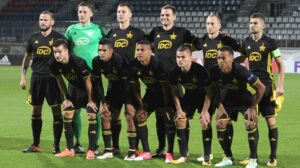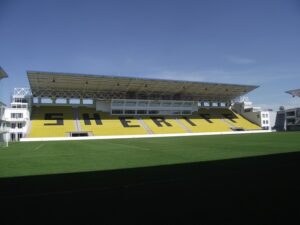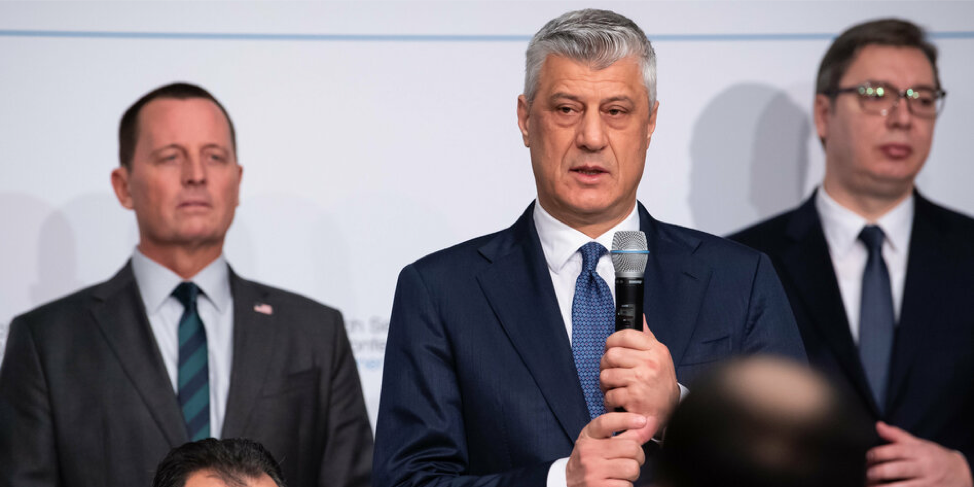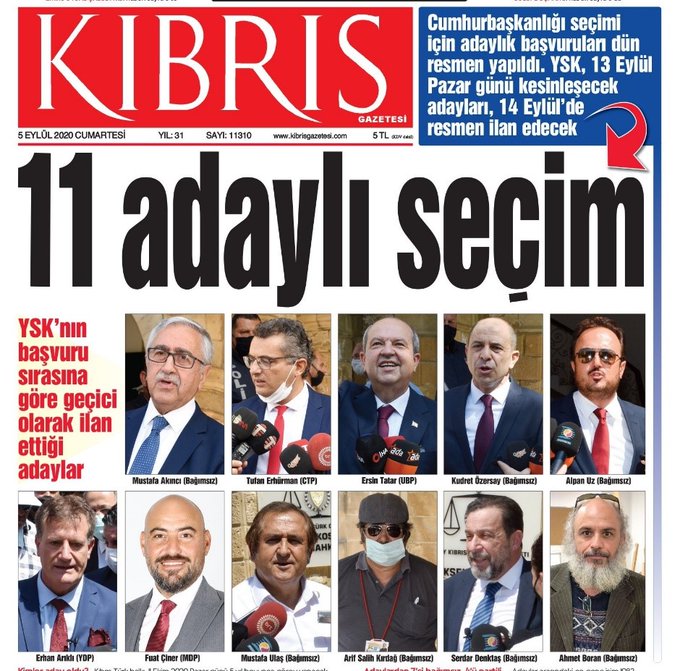FC Sheriff: Moldova’s Club with Foreign Players on Transnistrian Ground
Who beat Real Madrid?
On the 28th of September 2021, the reigning Moldovan football champion Sheriff Tiraspol won their away match at Real Madrid in their first-ever Champions League season. Undoubtedly, this was a historic result and probably the greatest upset in European club football since the Belorussian club “BATE” beat Bayern Munich in 2012. To somehow get an idea of the imbalance between the sides, it suffices to look at the record transfers of the club. Sheriff’s most valuable transfer in history happened in 2012, when the club bought Serbian striker Marko Markovski from the Greek side Skoda Xhanti. He only played 12 matches for Sheriff, scoring 6 times. Real, in contrast, has two players in its current squad that cost more than 100 million each: Belgium international Eden Hazard and Welsh international Gareth Bale.
But when football fans around Europe start to find Tiraspol on a map – on or look up why the club is named Sheriff – things start to get more complicated. Tiraspol calls itself a capital, not of Moldova, but of the Pridnestrovian Moldovan Republic (PMR), often called Transnistria. And Sheriff isn’t a quirky club name, but the name of a massive group of companies that owns the club. The football club that beat Real Madrid at the end of September is like no other, globally, and journalists and commentators have started to begin asking who actually beat Madrid that night.

Image: FC Sheriff squad for 2021/2022 (Source: worldfootball.net)
One way to look at it is looking at the actual players who beat Real Madrid that night. Not a single of the selected players on that evening is from Tiraspol, Transnistria or Moldova. Instead, the backbone of the team are experienced players from South America or football nations that do not regularly make it to World Cups, such as Uzbekistan, Trinidad and Tobago or Macedonia, who never quite made it to the top of European football. The rest of the squad that regularly does play is filled with exciting young talents from Africa, who often are scouted and bought straight from the continent. The few Transnistrians and Moldovans that are under contract at Sheriff rarely play.
The company
Playing in the Champions League and writing headlines globally definitely is a massive victory for Sheriff, the company conglomerate behind the club. Unlike Red Bull Salzburg, which has to rebrand its name (FC Salzburg) and stadium (“Stadium Salzburg”) whenever it plays in the Champions League, Sheriff was allowed to keep their company branding. On request, UEFA clarified that “the rules […] are applicable since the 2006/2007 season and do not apply to a club, such as Sheriff Tiraspol, which had already taken part in a UEFA competition under this name before the entry into force of these rules.” While Sheriff only made it to an actual UEFA competition in 2009, it did indeed compete under its branded name in Qualification rounds as early as 1999, enabling it to use that loophole today. De facto, however, there is no difference between Red Bull Salzburg and Sheriff Tiraspol – both are 100% owned and governed by the respective group of companies and function as a marketing tool for the brand, a construction that football fans around Europe regularly protest against, fearing a “sell-out” of the sport.
Sheriff is a group of companies based in Tiraspol that no visitor to Transnistria will manage to avoid. On the right bank of the Dniestr almost every supermarket and gas station is owned by and branded as Sheriff. The largest bank and telecommunications provider in the country, as well as the only upscale hotel and nightclub, some medical facilities, the bread factory and the local TV station are part of the group. In fact, there is barely any sizable profitable business in the de facto state that is not part of the Sheriff group, which was founded by the two former KGB agents Viktor Gushan and Ilya Kazmaly.
The main source for Sheriff’s wealth, however, is the group’s business abroad. The upscale brandy “Kvint” is renowned in the post-Soviet world and becomes increasingly popular in Europe, too. The Sheriff asset “Tirotex” is the second-largest textile factory in the continent and lately “Aquatir” became the largest producer of black caviar in Europe. All these companies directly benefit from the special status Transnistria has. Products branded as “made in Moldova”, which is de jure true, can be sold tax-free to the European market, while products branded as “made in Pridnestrovie” are sold tax-free to Russia. It is this pragmatic approach, which is openly promoted by the Chamber of Commerce of Transnistria, that differentiates Transnistria from other de facto states, in business and sports.
The state(s)
In sports, this pragmatism shows by the affiliation of clubs based in Transnistria to Moldovan national sports governing bodies. As the options to play football in a de facto state are usually very limited and clubs from similar entities like Abkhazia or Northern Cyprus are reduced to play each other, Sheriff Tiraspol and others opted to stay in Moldova, while the region they are in declared independence from Moldova and fought a war against it. Now that the club has become internationally known through its unlikely success, journalists across Europe and, in particular, in Moldova are arguing whether this is a victory for Moldova or for Transnistria. While most major news outlets in Moldova have celebrated the victory of Sheriff as that of a “Moldovan club”, some commentators from both sides of the de facto border argued that the club does not represent Moldova, but rather Transnistria.
The Moldovan sociologist Vitalia Spranceana argues that such a debate is almost irrelevant, as elite football clubs, such as those in the Champions League, “are nothing more than global traveling commercial circuses, incidentally linked to cities” anyways. As there was not a single player from Transnistria or Moldova on the pitch that night in Madrid, she certainly has a point. She argues that all the big clubs, from Qatar-owned Paris Saint-German or Chelsea, which is owned by the Russian oligarch Abramovich, to Sheriff Tiraspol are undergoing a “deterritorialization” and are only firmly linked to “dirty, semi-dirty and cleaner cash flows” today. Thus, it becomes irrelevant if Sheriff, the club, is based in the Moldovan capital Chisinau or the Transnistrian capital Tiraspol. It is neither a Moldovan, nor a Transnistrian club, but the club of Viktor Gushan, the co-owner of the Sheriff group that owns the club.

Image: Inside Sheriff Tiraspol’s stadium, where Real Madrid will play at the end of November, 2021 (Source: Sascha Düerkop)
An employee of the Ministry of Foreign Affairs of Pridnestrovie I spoke to, however, disagrees. He argues that “the most popular sport not only wins the hearts of people but is also an effective tool for increasing the recognizability of the state [Transnistria] around the world” and thus the success lets the world “learn about Pridnestrovian sports and about the country as a whole”. He describes FC Sheriff as a “tool for people’s diplomacy”. Official Tiraspol leaves no doubt that they see Sheriff as a Transnstrian club, as the stadium is based in Transnistria and the club owners hold Transnistrian passports. Asked about the affiliation to the Moldovan sports system, the employee states “FC Sheriff is a completely Pridnestrovian club, forced to have a Moldovan ‘residence permit’”, emphasizing the pragmatism of Transnistria mentioned above.
A little less euphoric, but still seemingly pleased with the result, Moldovan president Maia Sandu congratulated Sheriff following their win over Madrid. After a meeting with German president Frank-Walter Steinmeier, she said during a press conference “I congratulate the team for its victory and wish them the best of success for the following matches”, but linked immediately linked it to the conflict by adding: “When it comes to the Transnistria conflict, it is a very complicated topic, […], and we reiterate our position, which is to find a peaceful diplomatic solution.”
One victory – many winners?
In fact, the miracle of Sheriff’s win over Real Madrid has more than one winner. The Sheriff group of companies is getting more exposure for its brand than it ever got and it makes sure to use his marketing tool to promote the entire range of its product. It certainly is no coincidence that the players had to visit the black caviar production of “Aquatir” days after the match.
On a state level, Moldova massively benefits sportingly. The success of Sheriff is the biggest success in the history of the Moldovan Football Association and will help them to shoot up the UEFA rankings to get more money and more places in international tournaments in future. But Transnistria equally benefits from the exposure alone. A google analysis shows that the term “Transnistria” was globally looked up 100 times more often around the match than it is usually. Linked keywords around that peak were “Sheriff”, “Sheriff Tiraspol”, “Tiraspol” and “Champions League”.
Finally, and ironically, football might also be a winner of this miracle. The German football platform “ran” argued that Sheriff inherits “the values that made football big”, which is a cynical statement given that Sheriff is an oligarch-owned club. They refer to the fact that Real Madrid and other big names in European football tried to break away from football as it is and found their own elitist “Super League” that protects the interests of the super-rich clubs, a project that fans across Europe saw as the final move towards a sellout and thus protested continent-wide.
All this in mind, this match was more than 90 minutes of football. It was a victory of oligarchy and anti-commercialisation alike and a victory for Transnistria and its political adversary Moldova at the same time. Most of all, however, it was a victory of the 11 men on the pitch that night, many of which are likely to boost their career with this win, and football fans in Transnistria and Moldova, who finally will have the chance to see the top stars of the game at home for the return leg at the end of November.
Author: Sascha Düerkop




